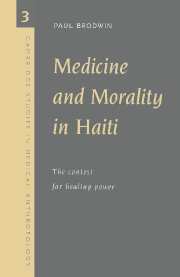Book contents
- Frontmatter
- Contents
- List of illustrations
- List of tables
- Acknowledgments
- Note on transliteration
- Glossary
- Introduction
- 1 The dialectics of healing power
- Part I History and ethnography of biomedicine
- 2 Metropolitan medicine and strategies of rule
- 3 Biomedicine in Jeanty
- 4 Medicalization and illness experience: two case-studies
- Part II The moral discourse of medical pluralism
- Notes
- Bibliography
- Index
2 - Metropolitan medicine and strategies of rule
Published online by Cambridge University Press: 15 December 2009
- Frontmatter
- Contents
- List of illustrations
- List of tables
- Acknowledgments
- Note on transliteration
- Glossary
- Introduction
- 1 The dialectics of healing power
- Part I History and ethnography of biomedicine
- 2 Metropolitan medicine and strategies of rule
- 3 Biomedicine in Jeanty
- 4 Medicalization and illness experience: two case-studies
- Part II The moral discourse of medical pluralism
- Notes
- Bibliography
- Index
Summary
Roots of present-day medical pluralism
Biomedicine is diffused throughout the plural health care system of Jeanty. Outside the dispensary walls and away from the control of its professional nursing staff, elements of Euro-American biomedicine have entered virtually the entire range of local therapies: from everyday domestic practices to the specialized treatments offered by herbalists, midwives, Protestant pastors, and servitors of the Iwa. It is impossible to locate biomedicine in a single physical, social, or ideological space.
Biomedicine thus exerts a broad effect on people's response to illness, and it enters the practice of other healers in complicated, unpredictable ways. For example, the village's sole official site of biomedical treatments is the state-run dispensary – a squat, five-room cinderblock building in the center of town. However, the influence of biomedicine extends into the most isolated hamlets through weekly visits by health care workers. Moving in the opposite direction, local midwives travel to the dispensary for monthly meetings where they receive medical supplies. Among the most faithful attendees are several women who routinely become possessed by their lwa during difficult deliveries (see chapter 3).
The flow of biomedical Pharmaceuticals also illustrates the interpenetration of biomedicine, other local institutions, and categorically distinct healing systems. People purchase Pharmaceuticals not only at the dispensary, but also at the twice-weekly village market, from the store-room of the French Catholic priest, and out of the bulging valises of itinerant vendors. They usually consume these medicines not under the watchful eye of medical professionals, but at home and in private, or even during healing rituals of the houngan, the specialist in serving the spirits (see chapters 4 and 6).
- Type
- Chapter
- Information
- Medicine and Morality in HaitiThe Contest for Healing Power, pp. 23 - 55Publisher: Cambridge University PressPrint publication year: 1996



